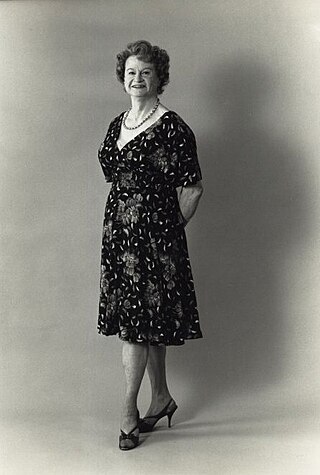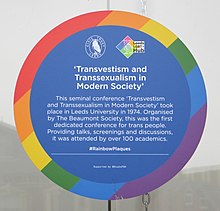Transvestism is the practice of dressing in a manner traditionally or stereotypically associated with a different gender.
The following outline is provided as an overview of and topical guide to transgender topics.
The American-Canadian sexologist Ray Blanchard proposed a psychological typology of gender dysphoria, transsexualism, and fetishistic transvestism in a series of academic papers through the 1980s and 1990s. Building on the work of earlier researchers, including his colleague Kurt Freund, Blanchard categorized trans women into two groups: homosexual transsexuals who are attracted exclusively to men and are feminine in both behavior and appearance; and autogynephilic transsexuals who experience sexual arousal at the idea of having a female body. Blanchard and his supporters argue that the typology explains differences between the two groups in childhood gender nonconformity, sexual orientation, history of sexual fetishism, and age of transition.

Sexuality in transgender individuals encompasses all the issues of sexuality of other groups, including establishing a sexual identity, learning to deal with one's sexual needs, and finding a partner, but may be complicated by issues of gender dysphoria, side effects of surgery, physiological and emotional effects of hormone replacement therapy, psychological aspects of expressing sexuality after medical transition, or social aspects of expressing their gender.
The Sex Orientation Scale (SOS) was Harry Benjamin's attempt to classify and understand various forms and subtypes of transvestism and transsexualism in people assigned male at birth, published in 1966. It was a seven-point scale ; it was analogous to the Kinsey Scale as it relates to sexual orientation, which also had seven categories.
Fantasia Fair is a week-long conference for cross-dressers, transgender and gender questioning people held every October in Provincetown, Massachusetts, a small Portuguese fishing village and largely gay and lesbian tourist village on the very tip of Cape Cod. This annual event is the longest-running transgender conference in the United States and it provides a week for attendees to experiment with gender-role identities and presentations in a safe and affirming community. The goal of the conference is to create a safe space in which crossdressers, transgender and transsexual people, and nonbinary-gendered people are accepted without judgement, can interact with their peers, and can advocate for their rights. In November, 1980 the event was featured in an article by D. Keith Mano in Playboy magazine and has in ensuing years has continued to generate publicity.
The classification of transgender people (transgender women specifically) into distinct groups has been attempted since the mid-1960s. The most common modern classifications in use are the DSM-5 and ICD, which are mainly used for insurance and administration of gender-affirming care.
Mak Nyah, alternatively spelled maknyah, is a Malay vernacular term for trans women in Malaysia. It arose in the late 1980s in order to distinguish trans women from other minorities.

A transgender person is someone whose gender identity differs from that typically associated with the sex they were assigned at birth.

Louis Graydon Sullivan was an American author and activist known for his work on behalf of trans men. He was perhaps the first transgender man to publicly identify as gay, and is largely responsible for the modern understanding of sexual orientation and gender identity as distinct, unrelated concepts.

Virginia Charles Prince was an American transgender woman and transgender activist. She published Transvestia magazine, and started Full Personality Expression, which later became Tri-Ess, for male heterosexual cross-dressers.
LGBT culture in Leeds, England, involves an active community of people who identify as lesbian, gay, bisexual, or transgender/transsexual. A BBC News Online article published in 2012 stated that, while Leeds City Council has not published statistics relating to the number of LGBT residents, the figure can be estimated at 10% of the overall population, which currently suggests a total of at least 77,000. The tenth year of the Leeds Pride march and celebration, held in 2016, was attended by over 40,000 people.

Roberta Perkins was an Australian sociologist, writer, and transgender rights and sex worker rights activist. She wrote several books and multiple academic articles on the semi-nomadic lives of transgender sex workers, and established the first assistance center for transgender people in Australia.

A transvestite pass was a doctor's note recognized by the governments of Imperial Germany and the Weimar Republic, under the support of sexologist Magnus Hirschfeld, identifying a person as a transvestite. Transvestite at this time referred to all individuals whose gender identity or preferred clothing was discordant to that associated with their assigned sex, and so included both cross-dressing and transgender people. As gender-confirming surgery was only an emerging practice in the early 20th century, obtaining a Transvestitenschein, along with an official name change, represented the maximum extent to which many trans individuals could transition.

This article addresses the history of transgender people across the British Isles in the United Kingdom, the British colonies and the Kingdom of England until the present day. Transgender people were historically recognised in the UK by varying titles and cultural gender indicators, such as dress. People dressing and living differently from their sex assignment at birth and contributing to various aspects of British history and culture have been documented from the 14th century to the present day. In the 20th century, advances in medicine, social and biological sciences and transgender activism have influenced transgender life in the UK.

The Transsexual Phenomenon is a medical textbook published by American endocrinologist and sexologist Harry Benjamin in 1966 with The Julian Press. The text is notable for its examination of transsexualism not as a psychological issue, but rather as a somatic disorder that should be treated through medicine. Benjamin argues that transvestism and transsexuality are a spectrum of conditions, requiring different treatments that ranged from hormone replacement therapy to surgical intervention.
Angela Lynn Douglas was an American transgender activist and singer. She was a transgender woman who performed as a rock musician and was a prominent pioneering figure in transsexual activism during the 1970s. She founded the Transsexual Action Organization (TAO), the first international trans organization. She wrote articles about the state of trans politics at the time for the Berkeley Barb, The Advocate, the Bay Area Reporter, Come Out! and Everywoman, in addition to TAO's Mirage magazine and Moonshadow Bulletin. She expressed racist attitudes at various points in her life, and at one point became active with the Nazi party.
Carol S. Riddell is a British feminist and socialist sociologist and transgender lesbian who was active in the UK Women's liberation movement in the 1970s. She is known for authoring Divided Sisterhood, the first feminist critique of Janice Raymond's book The Transsexual Empire.
The Beaumont Society is a human rights organisation based in the United Kingdom, which is run by transgender people to support their community. Founded in 1966, and named after Chevalier d'Eon, it provides social support for transgender people, and legal and medical information for practitioners in those fields. It also published periodicals, including the Beaumont Bulletin.
Della Aleksander (1923–2001) was a teacher and campaigner for trans rights. She was a co-producer of an episode of the current affairs programme Open Door, which was the first to feature trans women. She was a member of fascist organisations, such as the League of St George.








